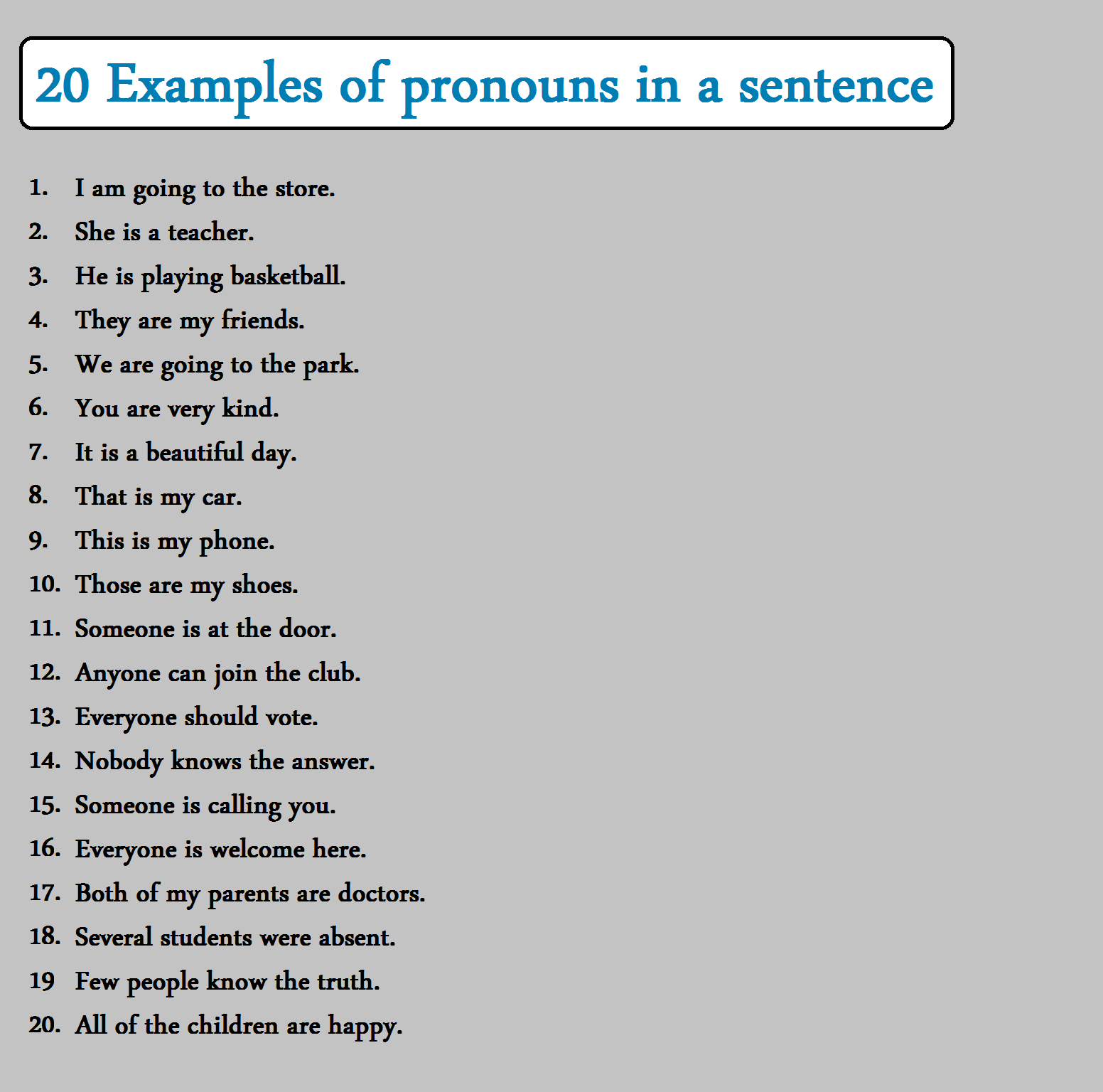20 Examples of pronouns in a sentence
 |
| 20 Examples of pronouns in a sentence |
Examples of Objective Pronouns in English exercises on Objective Pronouns in English, English Pronouns in sentences, Subject and Object Pronouns in English, and Examples of Subjective Pronouns in English, and for all students who are looking for sentences and examples of Objective pronouns in English to make it easier They have to understand this lesson. Follow us:
Objective pronouns are used to express the object with it, and these pronouns come after the verb and the preposition, and below we will learn in this article examples of object pronouns in English, follow us:
Me: It is used to express the singular (Male and Female), and this pronoun comes with the meaning of (With the speaker).
Example:
- She gives me the money
- He understands me
Us: This pronoun is used for the plural speakers.
Example:
- He always sends letters to us
You: This pronoun comes in the sense of sufficient address (as, how much, be), and is used to express the addressee in the singular and plural cases, and for both genders (Male and Female).
Example :
- I encourage you
Him: This pronoun is used with the absent singular in the accusative and dative cases, and it means (a distraction attached to the Male).
Example :
- Did you see Sam last week? Yes, I saw him last week
Her: a pronoun meaning distraction attached to the Female, and it is used with the absent singular in the accusative and dative cases.
Example :
- Do you hate her?
It: This pronoun comes in the sense of a distraction attached to the non-sane (inanimate objects, animals, plants), and is also used to express the absent singular.
Example :
- I like this movie. I saw it last Week,
Them (they, they): This pronoun is used in the plural to express the absent singular, the Male and Female, and the irrational.
Example :
- I told them the truth
English Pronouns in Sentences
Sentences about English pronouns, we will present to you a group of types of pronouns and then a group of sentences that contain different English pronouns:
- Objective Pronoun
- Subject Pronouns
- Possessive pronouns
Subject and object pronouns in English
The personal pronouns denote the speaker, the addressee, and the absentee, that is, the one who acts, and the nouns that function as an actor in the sentence are resolved, and the subject pronoun is used in the third person, to avoid repeating that we mention the actor a lot.
This explains the subject pronouns in English and how they are used.
Use Subject Pronoun
- The speaking singular=I
- The accusative singular=You
- The masculine singular is=He
- The absent female singular=She
- Singular (for the non-sane)=It
- Speaker plural=We
- The plural addressing=You
- The absent plural=They
Objective pronouns in English
They are pronouns that are used in the English language to replace or replace nouns that act as direct or indirect objects in a sentence.
Use Objective Pronoun
- Singular: tell me/love me/give me=me
- The dative singular tells you/loves you/gives =you
- The absent singular: tells him / loves him / gives him=him
- The absent singular: tells her/loves/gives her= her
- Singular: (backbiting for the non-sane)=it
- plural speaker: (us, participle)=us
- The accusative plural: tells you/loves you/gives you=You
- The absent plural of the same and the unreasonable: tells them/loves them/gives the= them
Here are 20 Examples:
- I am going to the store.
- She is a teacher.
- He is playing basketball.
- They are my friends.
- We are going to the park.
- You are very kind.
- It is a beautiful day.
- That is my car.
- This is my phone.
- Those are my shoes.
- Someone is at the door.
- Anyone can join the club.
- Everyone should vote.
- Nobody knows the answer.
- Someone is calling you.
- Everyone is welcome here.
- Both of my parents are doctors.
- Several students were absent.
- Few people know the truth.
- All the children are happy.
